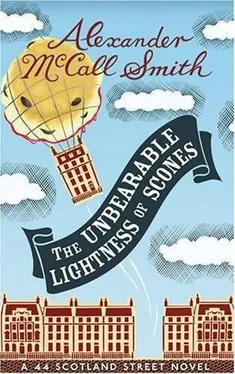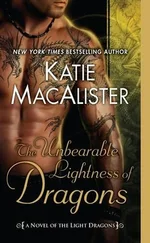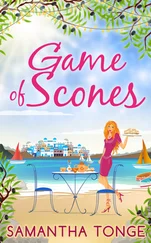Alexander Smith - Unbearable Lightness of Scones
Здесь есть возможность читать онлайн «Alexander Smith - Unbearable Lightness of Scones» весь текст электронной книги совершенно бесплатно (целиком полную версию без сокращений). В некоторых случаях можно слушать аудио, скачать через торрент в формате fb2 и присутствует краткое содержание. Жанр: Триллер, на английском языке. Описание произведения, (предисловие) а так же отзывы посетителей доступны на портале библиотеки ЛибКат.
- Название:Unbearable Lightness of Scones
- Автор:
- Жанр:
- Год:неизвестен
- ISBN:нет данных
- Рейтинг книги:4 / 5. Голосов: 1
-
Избранное:Добавить в избранное
- Отзывы:
-
Ваша оценка:
- 80
- 1
- 2
- 3
- 4
- 5
Unbearable Lightness of Scones: краткое содержание, описание и аннотация
Предлагаем к чтению аннотацию, описание, краткое содержание или предисловие (зависит от того, что написал сам автор книги «Unbearable Lightness of Scones»). Если вы не нашли необходимую информацию о книге — напишите в комментариях, мы постараемся отыскать её.
Unbearable Lightness of Scones — читать онлайн бесплатно полную книгу (весь текст) целиком
Ниже представлен текст книги, разбитый по страницам. Система сохранения места последней прочитанной страницы, позволяет с удобством читать онлайн бесплатно книгу «Unbearable Lightness of Scones», без необходимости каждый раз заново искать на чём Вы остановились. Поставьте закладку, и сможете в любой момент перейти на страницу, на которой закончили чтение.
Интервал:
Закладка:
“I think so,” said Bertie. “But they’ve all walked away.”
“I know who they are,” said the man. “It’s that Royal Company of Archers. They’ve got a clubhouse of some sort back there. That’s where they’ll be heading.”
84. Meet the Archers
Bertie looked at the man who had been shot by the arrow. He looked familiar for some reason, but he could not remember why. Then he remembered: he had seen his picture on a book his father had been reading, and he had asked him who it was. “Ian Rankin,” Stuart had replied.
“Excuse me,” Bertie now said. “Excuse me, but aren’t you Mr. Rankin?”
“Yes, I am. And you are?”
“Bertie Pollock, sir. I’m a member of the First Morningside Cub Scouts and – ”
Tofu interrupted him. “And my name is Tofu,” he said. “It’s an Irish name meaning…”
“Vegetable paste,” offered Bertie.
Tofu scowled. “Chieftain,” he said. “It means chieftain.”
Ian Rankin turned to the third member of the party. “And you, young man?”
“Ranald Braveheart McPherson,” came the squeaky voice.
“Well then,” said Ian Rankin. “I suggest that you three help me to solve the mystery of who shot me. Shall we go round to the Archers’ Hall?”
They made their way round the edge of the Meadows. Ian Rankin passed the arrow to Bertie to look after. “Evidence,” he said. “We must keep the evidence.”
“Will they try to run away again?” asked Tofu.
“We’ll see,” said Ian Rankin. “I don’t think they could run very fast – most of them. But we’ll see. We must realise that we’re dealing with some pretty desperate characters here. Earls and people of that sort. You never know what people like that will do.”
They continued along Buccleuch Place and then turned the corner at the second-hand bookshop.
“There’s one of your books in the window there, Mr. Rankin,” Bertie pointed out. “Look. And, look, it’s only one pound.”
They turned another corner and began to make their way down a small lane. At the end of the lane was a handsome building, in the eighteenth-century style, the front door of which was surmounted by a large coat of arms executed in stone. The door seemed firmly closed, but there was a light within indicating that the hall was in use.
Ian Rankin knocked firmly on the door and he, and his three uniformed assistants, to all intents and purposes Baker Street Irregulars, waited for a response.
Inside the hall, one of the archers, a brigadier, peered out of a small peep-hole.
“Oh no,” he muttered to somebody behind him. “That chap you shot by mistake. He’s outside with a gang of helpers.”
The other archer moved forward and looked through the peep-hole. “Oh dear,” he said. “But at least he’s still alive. And, do you know what? I think it’s that Rankin chap. What are we going to do?”
“Get the form,” said an archer behind him. “The usual form. It works every time.”
There was a general scurrying among the archers and a piece of paper was produced from a drawer in a bureau at the back of the hall. This was a waiver of liability form, drafted years ago by one of the lawyer members of the company, and it offered membership of the Royal Company of Archers in return for an agreement by the injured party not to pursue the matter.
“It’s saved an awful lot of trouble in the past,” said the brigadier, blowing the dust off the form. “Many years ago one of the then governors of the Bank of Scotland hit a city councillor in the leg when he let off an arrow at the Garden Party. Fortunately we had the form, and it did the trick. They’re thrilled to be invited, you see, and they sign it, in almost every case. Then we tell them what the uniform costs, and they go away. Works every time.”
With form in hand, the brigadier opened the door. “Yes?” he said, quite politely.
Ian Rankin turned to Bertie. “Was it him?” he asked.
Bertie shook his head. He could see the guilty archer, standing in the shadows, and he pointed to him. “It was that man over there, Mr. Rankin,” he said.
“All right,” said the brigadier. “Sorry about that. Some of the chaps are a little bit wonky in their shooting. Terribly sorry. But, here’s an idea. If you would care to forget about the matter, then we’ll make you a member! We have great fun and, as you see, we’ve got this marvellous hall! That picture over there is by Allan Ramsay, for example. It shows the Earl of Wemyss in his archer’s kit.”
He thrust the piece of paper into Ian Rankin’s hands.
“You should join, Mr. Rankin,” said Tofu. “It looks fun.”
“Ask them how much it costs first,” whispered Bertie.
The brigadier glowered at Bertie. “Just sign there,” he said.
Ian Rankin hesitated. There was no harm in this, he thought, and he was a kind man. He had received his apology and this very generous offer of membership. He signed.
“Good,” said the brigadier. “Now we’ll send you the details of the annual dues and the cost of the uniform. You can get it made up for just under five thousand.”
“Pounds?” said an astonished Ian Rankin.
“Yes,” said the brigadier. “Frightfully expensive. Sorry about that. But there we are. Sorry you won’t be joining us after all!”
And with that he shut the door. “I should have listened to you, Bertie,” said Ian Rankin. “That’s the way the establishment operates in this city, of course. They assimilate critics. It’s an old trick.” They walked back to Buccleuch Place.
“We’d better get on with our map-reading exercise,” said Bertie.
“And I should get on with my walk,” said Ian Rankin. “But I must thank you three young men for being such excellent detectives. I think that we solved that mystery really rather satisfactorily.”
They bade farewell to each other, and the three boys made their way back in the direction of the University Library. They were back on course now, and with some good navigation from Bertie, they soon succeeded in completing the task. Twenty minutes or so later, they found themselves reunited with Akela and the other cubs. Everybody was accounted for, except for one or two stragglers, who would probably turn up later on, Akela thought.
85. Gangsters, Drugs, Dreams – and Dogs
With the need to deal quickly with the late Lard O’Connor’s painting, before the much regretted Glaswegian gangster’s younger brother, Frankie O’Connor, travelled to Edinburgh to reclaim it, Angus had invited James Holloway to his studio to inspect the portrait of Burns.
“I’m pretty sure that this painting is what you think it is,” said James. “There’s so much evidence now. But the jardinière really clinches it.”
Angus had raised with James the issue of the jardinière which appeared in the background of the painting. He had been convinced that he had seen it somewhere before, and had wondered whether it had appeared in any other paintings of the period. James thought that it had not, but had taken the matter further and had eventually identified it as the Chinese jardinière belonging to Lord Monboddo, the famous eighteenth-century philosopher, linguist and lawyer.
“Here’s a recent photograph of that very jardinière,” said James, passing a glossy print to Angus. “You see, it’s the same in every particular.”
Angus took the photograph and held it alongside the jardinière in the Raeburn. There could be no doubt: the two were the same.
“So what that suggests,” James went on, “is that Raeburn painted Burns’s portrait when the poet was visiting Edinburgh. We know that he was received by Monboddo, who ran a salon in his house at 13 St. John’s Street. It was quite a salon, of course: not only Burns attended what Monboddo called his ‘learned suppers,’ but all the leading intellectual lights of the day.
Читать дальшеИнтервал:
Закладка:
Похожие книги на «Unbearable Lightness of Scones»
Представляем Вашему вниманию похожие книги на «Unbearable Lightness of Scones» списком для выбора. Мы отобрали схожую по названию и смыслу литературу в надежде предоставить читателям больше вариантов отыскать новые, интересные, ещё непрочитанные произведения.
Обсуждение, отзывы о книге «Unbearable Lightness of Scones» и просто собственные мнения читателей. Оставьте ваши комментарии, напишите, что Вы думаете о произведении, его смысле или главных героях. Укажите что конкретно понравилось, а что нет, и почему Вы так считаете.












